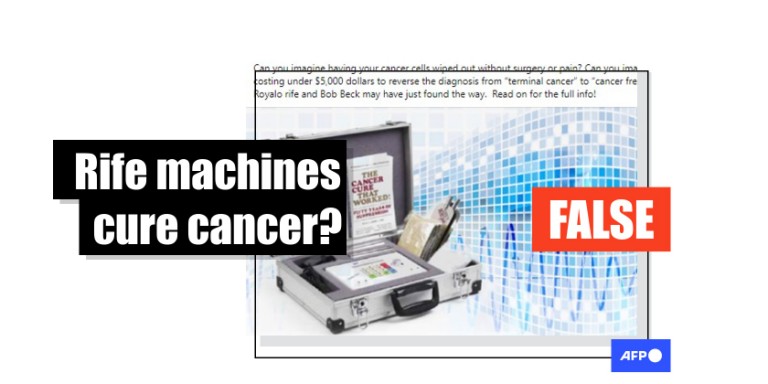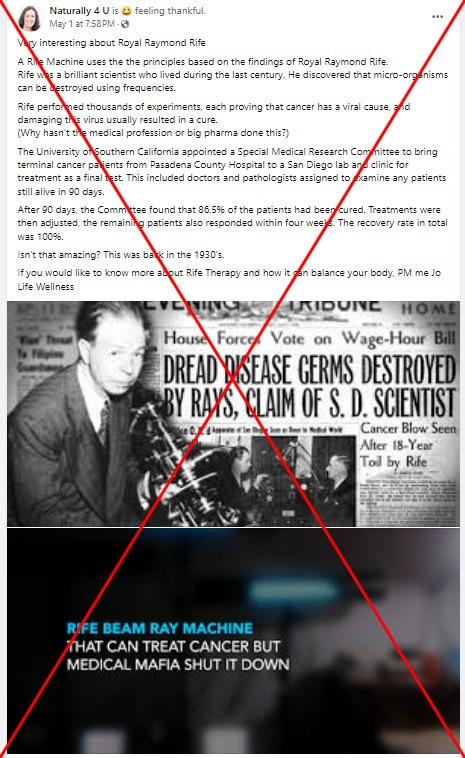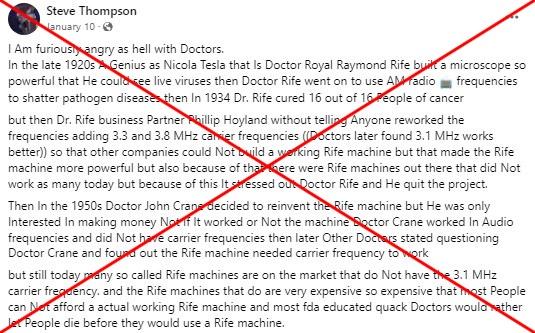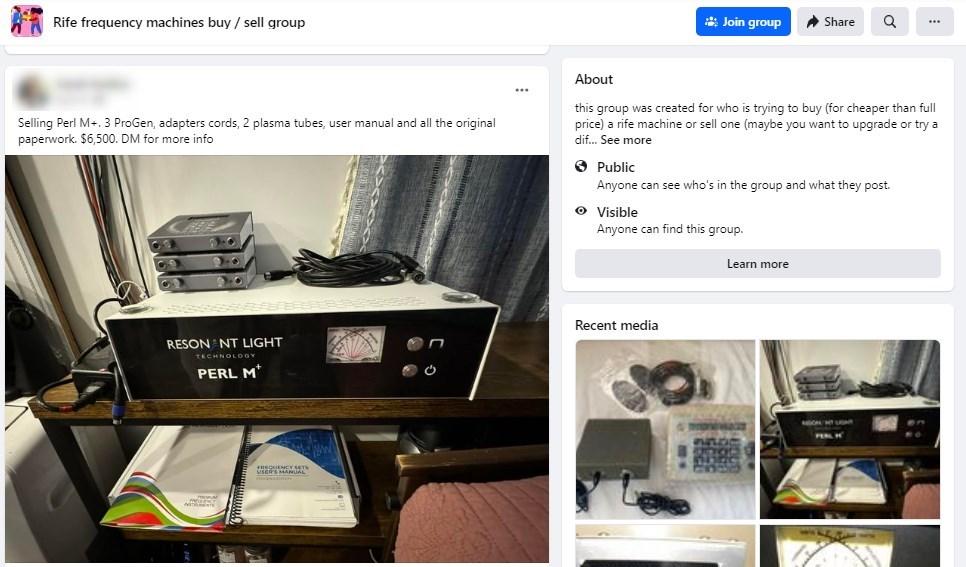
Unproven electromagnetic cancer treatment spreads online
- This article is more than one year old.
- Published on May 24, 2024 at 19:59
- 3 min read
- By Marisha GOLDHAMER, AFP USA
"Rife beam ray machine that can treat cancer but medical mafia shut it down," says text in an image shared May 1, 2024 on Facebook.
Companies and individuals touting his machines have spread across the internet, from blog entries and videos to LinkedIn, YouTube and Instagram posts. Some decry the supposed suppression of his research in English, French and Spanish.
"Doctors would rather let People die before they would use a Rife machine," says a January 10 Facebook post.


In books and social media posts, Rife's supporters say all medical conditions have an electromagnetic frequency. They claim the treatment he developed works by finding the frequency of the condition to then disable cells.
But the posts are the latest to tout unproven treatments for cancer -- many of which can cause patients to delay or forgo evidence-based care, experts warn.
“There is not any evidence that Rife machines can cure cancer," said Tim Rebbeck, professor of cancer prevention at the Dana-Farber Cancer Institute (archived here), in a May 22 email.
The American Cancer Society names the Rife Frequency Generator on a list of "questionable methods of cancer management" (archived here).
Who was Rife?
Rife was an American scientist who invented a high-powered microscope in the 1930s (archived here). He later said he could destroy bacteria made visible by the microscope by blasting them with electromagnetic waves oscillating at specific frequencies (archived here).
Some posts claim this technique healed terminal cancer patients, but AFP could not find any peer-reviewed studies backing that up.
Rife died in 1971. His obituary published in The Daily Californian newspaper said the inventor "lived to see some of what he considered his most important work discredited by the medical community."
But he remains a hero in holistic healing communities, with many companies still marketing treatments and devices using his name.
Dozens of Facebook groups -- some with thousands of members -- promote frequency therapy. In one "buy/sell" group dedicated to Rife machines, people list products for thousands of dollars.

"The FDA has not approved, cleared or authorized a Rife machine," press officer Audra Harrison said in a May 21, 2024 email, cautioning against products advertised on social media as "cures" for cancer.
The Rife machine delivers electrical energy usually through your hands or feet. Low-quality machines may cause electrical shocks or burns, and some device marketers have been the subject of fraud cases (archived here).
Treating cancer
Cancer deaths have fallen sharply in the United States in recent years amid improvements in diagnosis and treatment, and experts say survival rates for many forms of the disease continue to rise (archived here, here and here).
Some cancer treatments do involve the use of different wavelengths. Radiation therapy, for example, often aims X-rays at a specific place on the body to kill cancer cells (archived here).
But these treatments are not the same as using machines sold under Rife's name, which produce low electromagnetic energy waves similar to radio waves, according to Cancer Research UK (archived here).
Posts on X reference December 2023 research from scientists in the state of Texas that broke up cancer cells in mice by activating nanoscopic molecules with a precise wavelength of near-infrared light (archived here).
One of the study's authors, James Tour of Rice University (archived here), refuted claims that Rife's work is a cancer cure.
"There's no uniform way of killing all cancers. And so that's a very dangerous position to take," he said May 21.
Tour said there are scientists studying how to use waves in clinical treatments, but "radio waves just pass through the body." For waves to be effective, he said they have to have something to "interact with," such as a small dye molecule.
Tour also cautioned patients against taking medical advice from those unwilling to produce data backing it up. He said researchers, public health officials and doctors look to therapies that have been tested on large groups of people in double-blind studies.
"You have to study the veracity of the data, the quality of the data," he said.
More of AFP's reporting on health misinformation is available here.
Copyright © AFP 2017-2026. Any commercial use of this content requires a subscription. Click here to find out more.
Is there content that you would like AFP to fact-check? Get in touch.
Contact us
